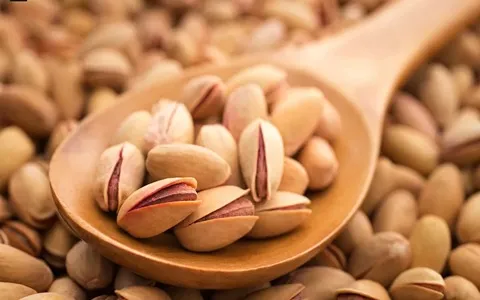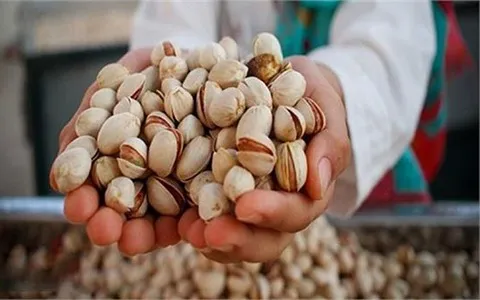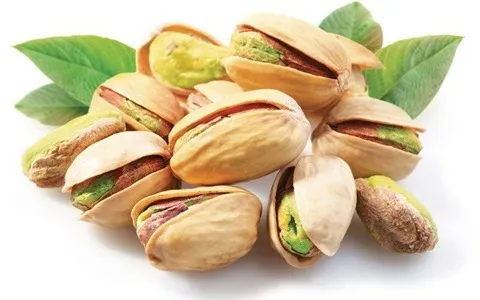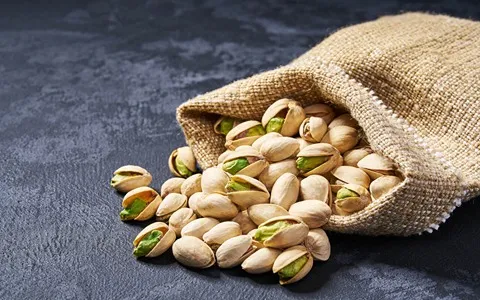Pistachios are members of the cashew family (Anacardiaceae) and are historically the oldest nuts that have been eaten for centuries.
They tend to grow in dry areas with warm climates.
The name pistachio comes from the Greek word "Pistakion", which means green walnut.
They are surrounded by a hard white outer skin and a thin layer of reddish skin around the green kernels.
Pistachios are a Middle Eastern and Central Asian delicacy.
They are carried in clusters and are mainly pollinated by the wind.
Pistachios are 1.5 to 2 cm long and spherical.
The hard covering around the core tends to split on one side without leaving a green core.
Turkey, Iran, Lebanon, Afghanistan, and a little north of the Caucasus in Russia are the origins of pistachios.
Pistachios are rich in antioxidants such as flavonoids, carotenoids, lutein, zeaxanthin, anthocyanins, and procyanidins.
They also contain vitamins B6, B1, proteins, fiber, copper, and phosphorus.
Plus, they're one of many low-calorie, low-fat nuts.
Therefore, pistachios have significant health benefits.
For example, they aid in weight loss, promote heart health, reduce cancer risk, and more.

PISTACHIO NUTRIENTS
Antioxidant-rich, anti-inflammatory Antioxidants such as lutein, beta-carotene, selenium, flavonoids, procyanidins, and gamma-tocopherol are abundant in pistachios.
These antioxidants protect the body from cell damage and free radicals.
Furthermore, lutein, beta-carotene, and flavonoids aid in the reduction of sun damage, the prevention of age-related physical damage, and the improvement of skin tone.
Pistachios can also help to prevent heart inflammation.
Heart disease and other cardiovascular illnesses can be caused by inflammation.
Polyphenols in pistachios lower the risk of heart disease by boosting anti-inflammatory and antiplatelet qualities, as well as enhancing the lining of the heart and blood vessels.

PISTACHIOS HEALING DISEASE
Cardiovascular health Pistachios contain good fats such as polyunsaturated and monounsaturated fats.
The unsaturated fats in pistachios nourish the heart.
Pistachios can also help people with diabetes and help reduce the risk of stroke.
This is due to the high amount of phytosterols in pistachios.
It reduces the body's absorption of dietary carbohydrates.
Carbohydrates are converted into sugars in the body.
Too many carbohydrates in the body can lead to high blood sugar levels.
The healthy fats in pistachios help lower blood pressure in the body.
In addition, they are rich in antioxidants, carotenoids, polyphenols, vitamin E, and vitamin C.
All of these nutrients help improve the elasticity of blood vessels.
Beneficial for Diabetics Low-GI pistachios.
Low in carbs, they release less sugar into the circulation when metabolized.
They also have a low glycemic index.
Low-glycemic meals reduce blood sugar in type 2 diabetes.
Diabetics should have 1-2 pistachio servings every other day. 30 grams of pistachios daily is healthful.
Beneficial for women Pistachios also help prevent and treat PCOS in women.
This is because it lowers the insulin levels in the body and balances the hormones.

SIDE EFFECTS OF EATING PISTACHIOS
- May cause high blood pressure
Excessive consumption of pistachios can lead to high blood pressure.
Additionally, you may experience dizziness, blurred vision, confusion, and fainting.
Additionally, consuming salted pistachios increases blood sodium levels and increases your chances of developing various cardiovascular diseases, including high blood pressure.
- Can Affect the Digestive System
Fiber is plentiful in pistachios.
Diarrhea, cramps, stomach pain, intestinal pain, and irritable bowel syndrome are all symptoms of eating too many pistachios.
Pistachios contain fructan, which can induce stomach allergies.

GENERAL EFFECTS OF PISTACHIOS ON HEALTH
Vitamin C, vitamin E, folic acid, protein, fiber, and minerals are all included in pistachios, making them a healthy snack.
Furthermore, antioxidants such as flavonoids, beta-carotene, zeaxanthin, anthocyanins, and procyanidins are abundant.
These nutrients can help with inflammation, cardiovascular disease prevention, sleep quality, digestion, and weight reduction.
Everything, however, is only useful when consumed in moderation.
As a result, consume a handful of pistachios (approximately 30 grams) every day.
It has the potential to give all of the health advantages.
Allergies, weight gain, cancer risk, kidney stones, digestive difficulties, and hypertension are all possible negative effects of eating too many pistachios.
As a result, eating pistachios in moderation can give a slew of health advantages while avoiding the negative consequences.


0
0